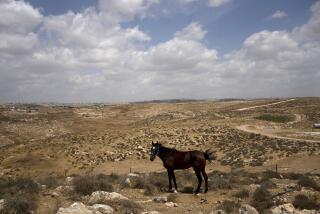Israeli Blocs Approve 6 West Bank Settlements
- Share via
JERUSALEM — Israel’s two largest political blocs have agreed to set up six new West Bank settlements by this fall. They would be the first to be built under the national unity government that took office four months ago.
The decision, announced Thursday, was made Wednesday night by officials named by the Cabinet to consider new settlements. Formal approval by the full Cabinet is considered certain.
The Labor alignment of Prime Minister Shimon Peres and the Likud bloc headed by Yitzhak Shamir agreed when they joined in the national unity government to establish five or six new settlements within a year. But Labor, which opposes new settlements in West Bank areas heavily populated by Arabs, had hoped that no action would be taken.
Over 120 Built
There are already more than 120 Jewish settlements on West Bank land taken from Jordan in the Six-Day War of 1967. About 25,000 Jews live in these settlements. There are about 800,000 Palestinian Arabs in the area, and the Arabs regard the settlements as a primary obstacle to any Mideast peace agreement.
President Reagan, more than two years ago, called for a freeze in Israeli settlement activity in hopes of advancing the peace process.
Israel, which has the largest per-capita foreign debt of any country in the world, and a continuing budget deficit, would appear to be hard-pressed to find money for new settlements. Peres has asked the United States for $800 million in additional emergency funds this fiscal year to supplement the $2.6 billion in American aid already pledged.
Meanwhile, according to Nissim Zvili, co-chairman of the World Zionist Organization’s settlement committee, existing West Bank settlements are underpopulated and heavily in debt.
According to Israeli accounts published last week, Zvili wrote to Peres saying it would be “sheer insolence to demand to set up new settlements” while houses and apartment buildings valued at $20 million stand empty on the West Bank.
Still, militant advocates of the settlements have been pressuring Likud to insist on the terms of the coalition agreement--if only to show that there is no ban on new settlements. They view establishing additional settlements as a necessary security precaution and as an inalienable right in territory they consider an integral part of Israel.
Of the six sites approved for new settlements by the joint Labor-Likud committee, two are in the Samarian hills north of Jerusalem, an area heavily populated by Arabs. One of these two is planned for Avnei Chefetz, east of Tulkarm, and the other for south of Nablus, along the trans-Samaria highway.
The other four are in areas nearer the border that divided Israel and Jordan before the 1967 war. They are Meot Adumim, east of Jerusalem; Peles, in the Jordan Valley; Asael, in the Hebron Hills, and Betar, in the so-called Etzion settlement bloc between Bethlehem and Hebron.
More to Read
Sign up for Essential California
The most important California stories and recommendations in your inbox every morning.
You may occasionally receive promotional content from the Los Angeles Times.













